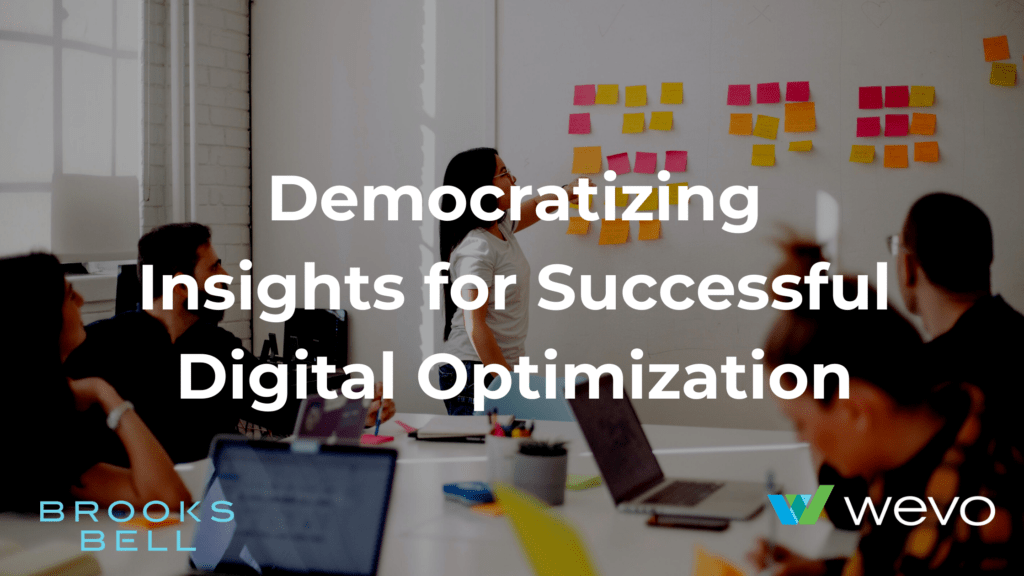In this installment in our new partner video series, Jenni sat down with Brooks Bell Strategic Consultant Sarah Mason to explore how companies can more effectively democratize user research data and insights to drive successful digital optimization.
Much like WEVO, Brooks Bell helps their customers transform through experimentation and insights. They provide an engine of insight generation for their clients through testing and user research, and offer a free experimentation and insights repository, illuminate® . Mason focuses on UXR, ResearchOps, and product strategy within Brooks Bell’s program consulting activities, leads strategy within their managed experimentation services, and is passionate about mixed methods and integrated data. You could say she’s a bit of an applied research evangelist.
Watch the full video of their conversation and read on for key insights from the chat.
Finding the People in the Data
Though Brooks Bell is mainly focused on user testing and optimization, it’s within the context of a higher-level order of operations: how experimentation can help solve complex business problems. They’re focused on integrated data – bringing both qualitative and quantitative together in new and interesting ways to help find common ground – oftentimes between a business’ perspective and the humans who then use their products and services.
“We talk about finding the people in the data and we’re always trying to do that in a way that pushes things forward and brings a more holistic 360° picture of those problems to be solved.” – Sarah Mason
Democratizing Insights: From Generation to Socialization
Democratizing insights is certainly a hot topic at the moment. Democratizing data and insights is all about making the information gleaned from user research and testing available to stakeholders outside of the field, without having to rely on a UXR expert. Even beyond expanding access, companies should also strive to democratize the generation of insights as well as the sharing and socialization of them.
“When we’re talking about democratizing the generation of insights, we’re really talking about bringing in more people, and a more diverse set of people, into the actual execution of research analysis, interpretation, and insight generation.” – Sarah Mason
Conducting the research with a broader range of practitioners and areas of expertise inherently requires research specialists to be more thoughtful in the planning stage. Consistently providing and adhering to the rigor required in terms of using best-fit methods and recruitment is crucial for avoiding the risk of generating lower quality insights.
In many cases, non-researchers such as product managers know the product and service intimately better than other members of the organization. They want to be making decisions based on the best information they can and to be able to do so in real-time.
Democratizing the socialization of insights empowers these non-researchers, also called PWDRs, or ‘People Who Do Research’, to apply the organization’s data and insights directly to the work they’re doing in an independent and empowered way.
“I think that’s where tools like WEVO can play a really significant role in enabling those non-researchers, or PWDRs, to help provide the structure and the guardrails required to ensure that research quality isn’t diminished, but it’s driven by somebody who understands exactly what they’re trying to get out of it and can be picked up and used at the exact moment when they need it.” – Sarah Mason
Designing a Winning Optimization Program
When done right, gathering, developing, socializing, and then aligning insights around quality and size can change an organization fundamentally, even shifting the way they operate.
“When you have a solid growing body of insights that’s managed well and is made accessible to everyone, you can have more wins, which everybody wants. You can operate more efficiently because you’re not spinning your wheels. You can leverage those insights across tests and teams and even across different parts of an organization.” – Sarah Mason
But there is a certain protocol to follow to ensure a successful optimization program. Mason suggests moving beyond focusing solely on wins and tracking KPIs to zoom out and get a holistic view of the wider organization.
“If we’re talking about a winning optimization program, we really have to be talking about impact. Once you’ve got that optimization program that’s turning out quality insights that are transferable and can be leveraged across those different parts [of the business], they’re going to be having a greater impact at higher levels. That can mean growth for that optimization team. It can mean greater influence, and it can mean helping grow a culture of experimentation more broadly across an organization.” – Sarah Mason
Overcoming Roadblocks to Democratization
Even knowing this, there is still a wealth of tools and processes that can block the successful democratization of insights. But Mason argues that the biggest problems can come from the people themselves. Ambivalence and skepticism coming from an organization’s top levels can hinder progress.
“That old school gut-based decision-making leadership style can work in some situations, but in most cases, it doesn’t – or it doesn’t work as well. Especially if you’re talking about something like a product team where months and years of planning go into the evolution of a product. It can lead to inefficiencies and whiplash when somebody is coming in with almost an opinion-based directive that can shift so much work in different directions.” – Sarah Mason
Starting by securing buy-in from the top and helping them understand that you want to be operating from an insights-driven culture is critical.
The second big blocker to democratization can be the very real concern that by opening up testing or research to non-specialists, data quality could be threatened. It’s a legitimate concern, because, according to Mason, bad data or insights can be worse than no data or insights.
But there are ways to prevent this. As Mason states, “A tool like WEVO can help ensure that that rigor and quality aren’t lost in the process of democratization.”
Reaping the Benefits
One of the key benefits of democratizing insights is having the capability and confidence to use them to make timely business decisions. Getting data and insights in real-time allows you to evolve quickly and increases willingness to change as new data comes in, allowing you to be far more agile and work iteratively.
Another big benefit is alignment. If everyone is centered and oriented towards insights and they’re all looking at the same insights, then a sense of alignment and purpose flows naturally.
“It’s not just looking at the insights. If you’re democratizing by bringing people in from the ground up and from the get-go, then there’s alignment all the way through, because they’ve witnessed that collection of insights and they have buy-in that doesn’t need to happen after the fact.” – Sarah Mason
Ready to start democratizing insights at your organization? See how WEVO can help you safely and successfully democratize insights to optimize your digital experiences.



